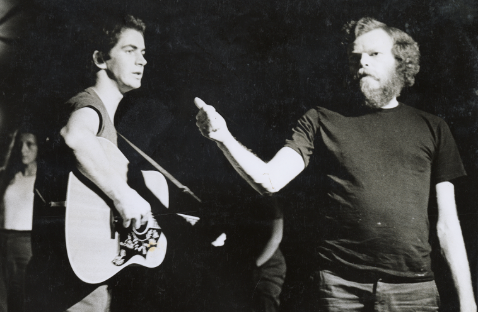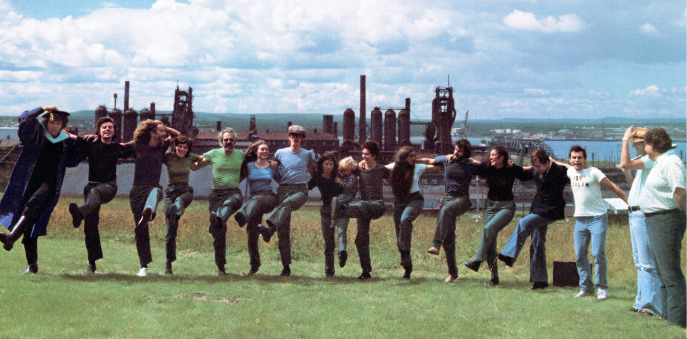L-R: Maynard Morrison, Kenzie MacNeil, Ralph Dillon, Kathy MacKeigan, Ernie MacAulay, Joanne Rolls, Max MacDonald, Linda & Rene Libbus, Ronnie MacEachern, Laurie Coffin, Kevin Cameron, Kathy MacGuire, Peter Dockwrey, Dave Harley, Berkley Lamey, Gary Walsh
BY Richard Lorway
PHOTO CREDITS Beaton Institute
The 1960s and ‘70s was a time of sweeping economic and cultural change in what was then called Industrial Cape Breton.
The early 60s was a period of prosperity, with the steel plant and coal mines employing thousands in well-paid jobs. Thanks to the post-war Baby Boom, over half the population was high-school age or younger. Local teens were quick to embrace every piece of pop culture to hit our shores — American sitcoms, the British Invasion, Woodstock, and so on. The Sydney Rotary Club staged annual Broadway musicals that had huge community support. The overall mood was decidedly positive.
Then in 1967, Hawker Siddley announced the impending closure of the steel plant. The community rallied to stage a March of Concern and the Province stepped in to take over plant operations, but the mood had soured. In the 1970s, the talk of decline and leaving to find work was in the air.
In the midst of this turmoil, a group of students attending Xavier College in Sydney were being mentored by Harry and Liz Boardmore in the art of live theatre.
“It was a different time then,” said Maynard Morrison. “Maybe we were young and naive, but our generation thought that the power of art could change the world. We believed we could make a difference.”
Local singer/songwriter, Kenzie MacNeil, was also part of that group. In 1977, Kenzie successfully applied for a summer grant to form a theatre troupe and put on a series of plays at The Lycaeum, and the Steel City Players was born. One of the plays had to be an original Maritime production, which led to the creation of The Rise and Follies of Cape Breton Island, a Vaudeville-like show comprised of songs and sketch comedy based upon local culture.
“We had worked informally on developing the material for years,” said Kenzie. “We were always doing bits based upon the absurdity of regional politics and local characters. We had so much fun together. Once we nailed the concept, the show almost wrote itself.”
“Honestly, we weren’t sure if anyone would show up on opening night,” said Maynard. “But just before we went on, our stage manager ran into the dressing room and said, ‘There’s a huge lineup down the stairs, back to Dorchester, and around the corner!’”
As well as humour, The Rise and Follies had a serious side that explored Cape Breton’s economic and political woes, and our ways of coping with change. And like good art often does, it took the community’s shared experience and placed it in a different context, so it could be seen with fresh eyes.

Ronnie MacEachern and Frank MacDonald
One of the more poignant scenes featured a song by Ronnie MacEachern called Go Off On Your Way, which explored youth out-migration by listing the names of those who had left, and wishing them joy in their new homes.
The first show also introduced The Island, a song by Kenzie MacNeil which quickly became the unofficial anthem of Cape Breton.
“I had the song in the works for some time,” said Kenzie, “ but I was struggling with the lyrics. I literally finished it the night before the first show, we rehearsed it once, then performed it in front of an audience.”
And as they say, the rest is history.
There were many other high points too numerous to mention in the 1977 Rise and Follies. Songs and characters became part of the mainstream, and social issues were explored. The show hosted important conversations and provided validation of Cape Breton culture to the community.
The Rise and Follies’ success led to many annual sequels, some popular record albums, and a 3-part CBC TV pilot. Arguably, it also inspired the subsequent outpouring of original music and theatre, and kickstarted a few careers in entertainment. A line can also be drawn to bands like Buddy & the Boys, the theatre program at Cape Breton University, and to later productions like The Summertime Revue.





1
Log In or Sign Up to add a comment.- 1
arrow-eseek-e1 - 1 of 1 itemsFacebook Comments